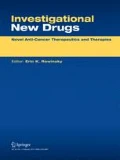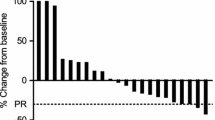Summary
Selumetinib is a potent, selective MEK inhibitor with efficacy in several tumor models. This study compared selumetinib with capecitabine in patients with advanced or metastatic pancreatic cancer who had been pretreated with a gemcitabine-based regimen. In this randomized, multicenter phase II study (NCT00372944), patients received either 100 mg oral selumetinib twice daily or 1,250 mg/m2 oral capecitabine twice daily for 2 weeks followed by a 1-week break, given in 3-weekly cycles. The primary endpoint was overall survival. In all 70 patients were randomized. The median survival was 5.4 months in the selumetinib group and 5.0 months in the capecitabine group (hazard ratio 1.03; two-sided 80% confidence interval = 0.68,1.57; P = 0.92). Disease progression events occurred in 84% and 88% of patients in the selumetinib and capecitabine treatment groups, respectively. Gastrointestinal adverse events (nausea, vomiting and diarrhea) were commonly observed in both treatment groups. Other frequently reported adverse events were acneiform dermatitis and peripheral edema with selumetinib, and palmar-plantar erythrodysaesthesia with capecitabine. There was no statistically significant difference in overall survival between selumetinib and capecitabine as second-line treatment in patients with advanced pancreatic cancer. Selumetinib was well tolerated with a manageable safety profile.


Similar content being viewed by others
References
Ferlay J, Autier P, Boniol M et al (2007) Estimates of the cancer incidence and mortality in Europe in 2006. Ann Oncol 18:581–592
Jemal A, Siegel R, Ward E et al (2009) Cancer statistics, 2009. CA Cancer J Clin 59:225–249
American Cancer Society (2010) Cancer facts & figures 2009. http://www.cancer.org/acs/groups/content/@nho/documents/document/500809webpdf.pdf. Accessed October 2010
NCCN Practice Guidelines in OncologyTM (2010) Pancreatic adenocarcinoma (version 2.2010). Available at: http://www.nccn.org/professionals/physician_gls/f_guidelines asp. Accessed October 2010
Cartwright TH, Cohn A, Varkey JA et al (2002) Phase II study of oral capecitabine in patients with advanced or metastatic pancreatic cancer. J Clin Oncol 20:160–164
Wang D, Boerner SA, Winkler JD, Lorusso PM (2007) Clinical experience of MEK inhibitors in cancer therapy. Biochim Biophys Acta 1773:1248–1255
Messersmith WA, Hidalgo M, Carducci M, Eckhardt SG (2006) Novel targets in solid tumors: MEK inhibitors. Clin Adv Hematol Oncol 4:831–836
Almoguera C, Shibata D, Forrester K et al (1988) Most human carcinomas of the exocrine pancreas contain mutant c-K-ras genes. Cell 53:549–554
Smit VT, Boot AJ, Smits AM et al (1988) KRAS codon 12 mutations occur very frequently in pancreatic adenocarcinomas. Nucleic Acids Res 16:7773–7782
Wang JY, Wilcoxen KM, Nomoto K, Wu S (2007) Recent advances of MEK inhibitors and their clinical progress. Curr Top Med Chem 7:1364–1378
Yeh TC, Marsh V, Bernat BA et al (2007) Biological characterization of ARRY-142886 (AZD6244), a potent, highly selective mitogen-activated protein kinase kinase 1/2 inhibitor. Clin Cancer Res 13:1576–1583
Adjei AA, Cohen RB, Franklin W et al (2008) Phase I pharmacokinetic and pharmacodynamic study of the oral, small-molecule mitogen-activated protein kinase kinase 1/2 inhibitor AZD6244 (ARRY-142886) in patients with advanced cancers. J Clin Oncol 26:2139–2146
Therasse P, Arbuck SG, Eisenhauer EA et al (2000) New guidelines to evaluate the response to treatment in solid tumors. European Organization for Research and Treatment of Cancer, National Cancer Institute of the United States, National Cancer Institute of Canada. J Natl Cancer Inst 92:205–216
Rubinstein LV, Korn EL, Freidlin B et al (2005) Design issues of randomized phase II trials and a proposal for phase II screening trials. J Clin Oncol 23:7199–7206
Carroll KJ (2009) Back to basics: explaining sample size in outcome trials, are statisticians doing a thorough job? Pharm Stat 8:333–345
Pelzer U, Kubica K, Stieler J et al (2008) A randomized trial in patients with gemcitabine refractory pancreatic cancer. Final results of the CONKO 003 study. J Clin Oncol 26:4508
Oettle H, Pelzer U, Stieler J et al (2005) Oxaliplatin/folinic acid/5-fluorouracil [24 h] (OFF) plus best supportive care versus best supportive care alone (BSC) in second-line therapy of gemcitabine-refractory advanced pancreatic cancer (CONKO 003). J Clin Oncol 23:4031
Yi SY, Park YS, Kim HS et al (2009) Irinotecan monotherapy as second-line treatment in advanced pancreatic cancer. Cancer Chemother Pharmacol 63:1141–1145
Androulakis N, Syrigos K, Polyzos A et al (2005) Oxaliplatin for pretreated patients with advanced or metastatic pancreatic cancer: a multicenter phase II study. Cancer Invest 23:9–12
Oettle H, Arnold D, Esser M et al (2000) Paclitaxel as weekly second-line therapy in patients with advanced pancreatic carcinoma. Anticancer Drugs 11:635–638
Boeck S, Weigang-Kohler K, Fuchs M et al (2007) Second-line chemotherapy with pemetrexed after gemcitabine failure in patients with advanced pancreatic cancer: a multicenter phase II trial. Ann Oncol 18:745–751
Wolpin BM, Hezel AF, Abrams T et al (2009) Oral mTOR inhibitor everolimus in patients with gemcitabine-refractory metastatic pancreatic cancer. J Clin Oncol 27:193–198
Kulke MH, Blaszkowsky LS, Ryan DP et al (2007) Capecitabine plus erlotinib in gemcitabine-refractory advanced pancreatic cancer. J Clin Oncol 25:4787–4792
Ulrich-Pur H, Raderer M, Verena KG et al (2003) Irinotecan plus raltitrexed vs raltitrexed alone in patients with gemcitabine-pretreated advanced pancreatic adenocarcinoma. Br J Cancer 88:1180–1184
Demols A, Peeters M, Polus M et al (2006) Gemcitabine and oxaliplatin (GEMOX) in gemcitabine refractory advanced pancreatic adenocarcinoma: a phase II study. Br J Cancer 94:481–485
Xiong HQ, Varadhachary GR, Blais JC et al (2008) Phase 2 trial of oxaliplatin plus capecitabine (XELOX) as second-line therapy for patients with advanced pancreatic cancer. Cancer 113:2046–2052
Tsavaris N, Kosmas C, Skopelitis H et al (2005) Second-line treatment with oxaliplatin, leucovorin and 5-fluorouracil in gemcitabine-pretreated advanced pancreatic cancer: a phase II study. Invest New Drugs 23:369–375
Gebbia V, Maiello E, Giuliani F et al (2007) Second-line chemotherapy in advanced pancreatic carcinoma: a multicenter survey of the Gruppo Oncologico Italia Meridionale on the activity and safety of the FOLFOX4 regimen in clinical practice. Ann Oncol 18(6):vi124–vi127
Pelzer U, Stieler J, Roll L et al (2009) Second-line therapy in refractory pancreatic cancer. results of a phase II study. Onkologie 32:99–102
Cantore M, Rabbi C, Fiorentini G et al (2004) Combined irinotecan and oxaliplatin in patients with advanced pre-treated pancreatic cancer. Oncology 67:93–97
Ignatiadis M, Polyzos A, Stathopoulos GP et al (2006) A multicenter phase II study of docetaxel in combination with gefitinib in gemcitabine-pretreated patients with advanced/metastatic pancreatic cancer. Oncology 71:159–163
Brell JM, Matin K, Evans T et al (2009) Phase II study of docetaxel and gefitinib as second-line therapy in gemcitabine pretreated patients with advanced pancreatic cancer. Oncology 76:270–274
Capecitabine Summary of Product Characteristics (2008) F Hoffman-La Roche Ltd
Acknowledgements
We thank Dr Sally Humphries, from MediTech Media, who provided medical writing support and Helen Williams, from iMed Comms, who provided editorial assistance funded by AstraZeneca. Dr Gillian Pover is no longer an employee of AstraZeneca.
Funding
This was a phase II signal-searching study funded by AstraZeneca.
Author information
Authors and Affiliations
Corresponding author
Rights and permissions
About this article
Cite this article
Bodoky, G., Timcheva, C., Spigel, D.R. et al. A phase II open-label randomized study to assess the efficacy and safety of selumetinib (AZD6244 [ARRY-142886]) versus capecitabine in patients with advanced or metastatic pancreatic cancer who have failed first-line gemcitabine therapy. Invest New Drugs 30, 1216–1223 (2012). https://doi.org/10.1007/s10637-011-9687-4
Received:
Accepted:
Published:
Issue Date:
DOI: https://doi.org/10.1007/s10637-011-9687-4




